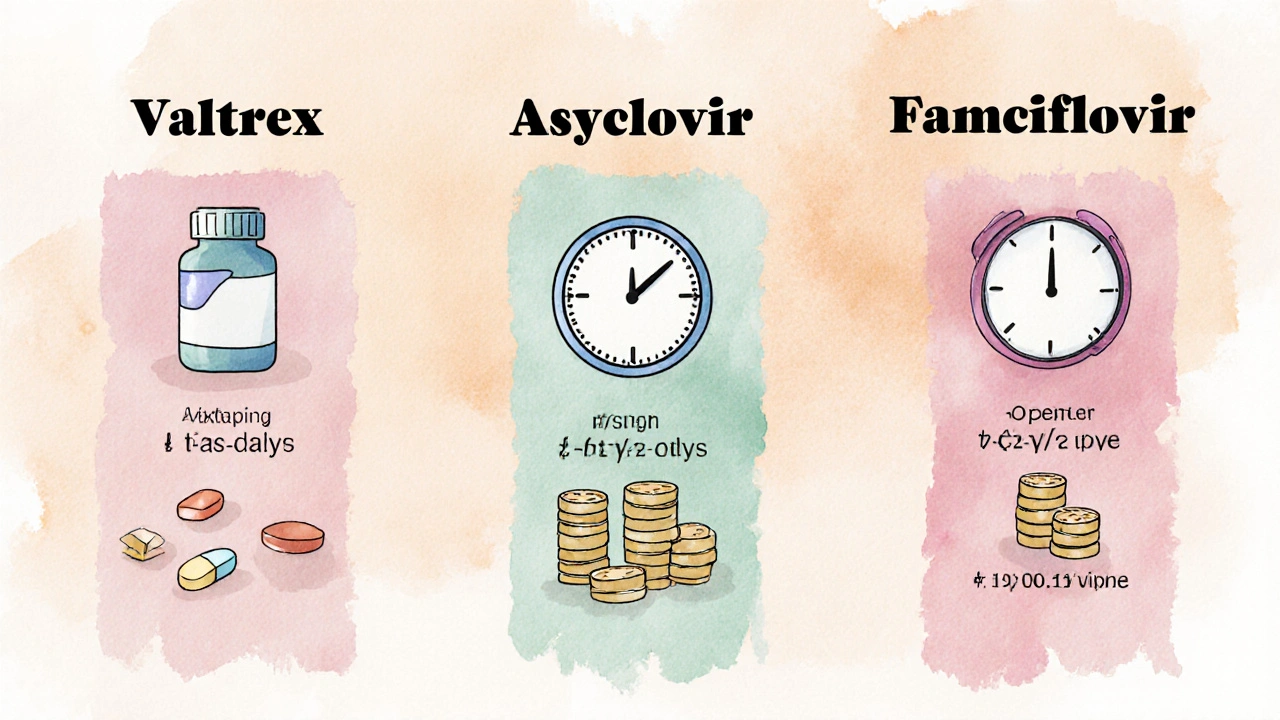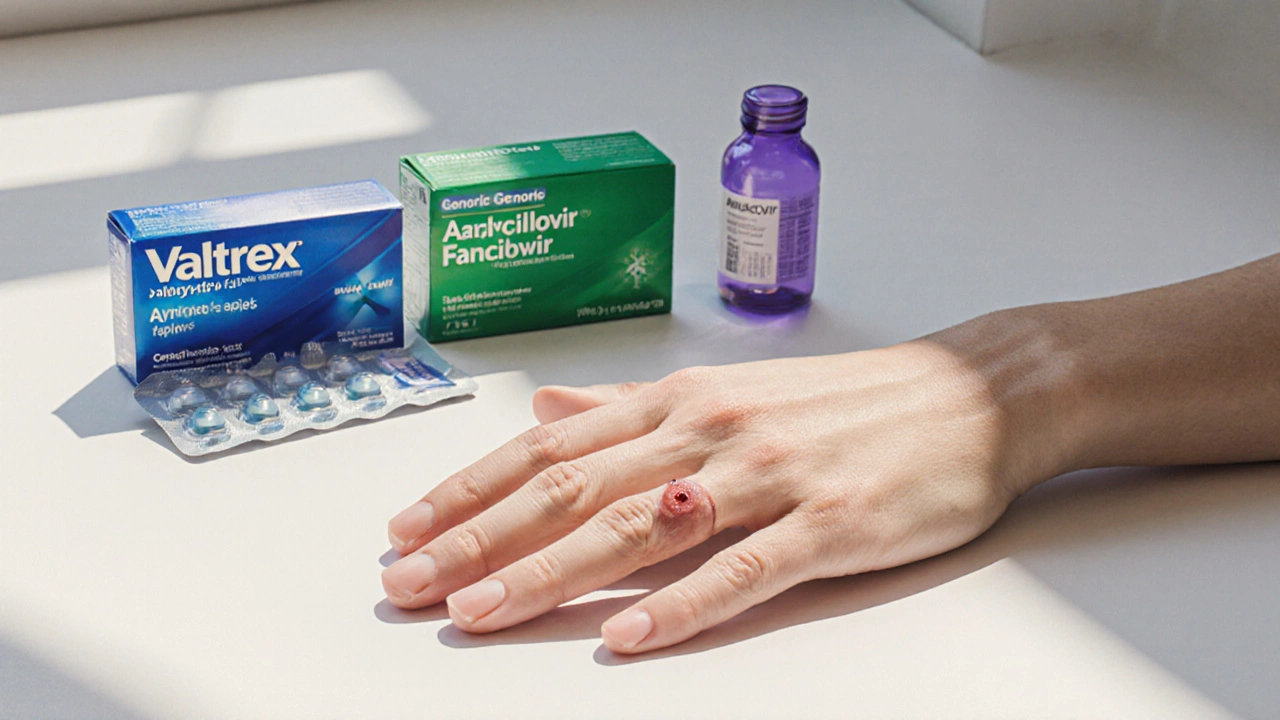Antiviral Choice Comparison Tool
Recommended Antiviral Option
Comparison Table
| Drug | Dosing Frequency | Cost (AU$) | Side Effects | Notes |
|---|---|---|---|---|
| Valtrex (Valacyclovir) | Once-Twice Daily | $45-$70 | Headache, Nausea | High bioavailability, good for suppressive therapy |
| Acyclovir (Zovirax) | Three-Five Times Daily | $15-$30 | GI Upset, Neurotoxicity | Cheapest generic, good for pregnancy |
| Famciclovir (Famvir) | Twice-Thrice Daily | $35-$55 | Headache, Fatigue | Good balance of convenience and potency |
| Penciclovir Cream | Five Times Daily | $20-$30 | Local Irritation | Topical, no systemic side effects |
| Docosanol (Abreva) | Five Times Daily | $25-$35 | Minimal | Over-the-counter, early-stage cold sores |
When you’re dealing with cold sores, genital herpes, or shingles, the first question is usually - which antiviral will work best for me? Valtrex (valacyclovir) is the go‑to for many, but there are several other options that can be cheaper, easier to take, or have a different side‑effect profile. This guide breaks down the most common alternatives, compares key factors like dosing, cost, and safety, and helps you decide which drug matches your needs.
Quick Takeaways
- Valtrex offers the highest bioavailability (≈55%) and the shortest treatment courses for most herpes infections.
- Acyclovir is the cheapest generic but requires more frequent dosing.
- Famciclovir sits between Valtrex and Acyclovir on cost and convenience.
- Topical penciclovir or docosanol can be useful for milder cold‑sores when oral therapy isn’t needed.
- Consider kidney function, pregnancy status, and drug interactions before picking a drug.
What Is Valtrex (Valacyclovir)?
Valtrex is a brand name for valacyclovir, an oral antiviral that rapidly converts to acyclovir in the body. Approved by the FDA in 1995, it treats herpes simplex virus (HSV‑1 & HSV‑2) infections, varicella‑zoster virus (shingles), and suppresses recurrent outbreaks. Its high oral bioavailability (≈55%) means you can take it once or twice daily, unlike older acyclovir regimens that need five doses a day.
Top Alternatives to Valtrex
Below are the most frequently prescribed antivirals that compete with Valtrex:
- Acyclovir - the original guanosine analogue, available as a generic, cheaper but requires three‑to‑five daily doses.
- Famciclovir - a pro‑drug of penciclovir, approved in 1998, offers twice‑daily dosing for shingles.
- Penciclovir (topical) - a cream used for cold‑sores, works locally and avoids systemic side effects.
- Docosanol (Abreva) - an over‑the‑counter topical that blocks viral entry; best when started within 48hours of a cold‑sore.

Comparison Table: Valtrex vs. Alternatives
| Generic/Brand | Typical Dose | Bioavailability | Daily Doses | Avg. Cost (AU$) per 30‑day supply | Common Uses | Notes on Side Effects |
|---|---|---|---|---|---|---|
| Valacyclovir (Valtrex) | 500‑1000mg | ≈55% | 1‑2 | $45‑$70 | HSV‑1/2 outbreaks, shingles, suppressive therapy | Headache, nausea; rare kidney impact in high‑dose |
| Acyclovir (Zovirax) | 200‑400mg | ≈15‑30% | 3‑5 | $15‑$30 | HSV‑1/2, genital herpes, neonatal prophylaxis | GI upset, reversible neurotoxicity at high doses |
| Famciclovir (Famvir) | 250‑500mg | ≈77% (as penciclovir) | 2‑3 | $35‑$55 | Shingles, HSV‑1/2, oral herpes | Headache, fatigue; mild renal considerations |
| Penciclovir Cream | Apply 5% cream 5×/day | Topical (local) | 5 | $20‑$30 (30g tube) | Cold‑sores (HSV‑1) | Local irritation; no systemic toxicity |
| Docosanol (Abreva) | Apply 10% ointment 5×/day | Topical (blocks entry) | 5 | $25‑$35 (30g tube) | Early‑stage cold‑sores | Minimal; rare skin rash |
How to Choose the Right Antiviral for You
- Severity and frequency of outbreaks. If you experience frequent genital herpes recurrences, a suppressive regimen like Valtrex 500mg daily is evidence‑based. For occasional cold‑sores, a topical penciclovir or docosanol may be enough.
- Convenience. Fewer daily doses improve adherence. Valtrex (once‑twice daily) beats Acyclovir’s five‑times‑a‑day schedule for most patients.
- Kidney function. All these drugs are renally cleared. In chronic kidney disease, dose‑adjustment is crucial; Valtrex’s higher potency means you may need a larger reduction.
- Pregnancy & breastfeeding. Acyclovir has the longest safety record in pregnancy, while Valtrex is classified Category B in Australia and considered safe after the first trimester. Famciclovir lacks extensive data, so clinicians often default to acyclovir.
- Cost & insurance coverage. The Australian PBS subsidizes Valtrex for recurrent genital herpes and shingles, but generic acyclovir remains cheapest for short courses.
Potential Pitfalls and Drug Interactions
Even though these antivirals are generally well‑tolerated, a few red flags are worth noting:
- Nephrotoxicity. High‑dose Valtrex combined with NSAIDs or probenecid can raise serum levels, stressing the kidneys.
- Neuro‑toxicity. Acyclovir can cause confusion or tremors in elderly patients with renal impairment.
- Immunosuppressed patients. All agents may need longer durations; famciclovir’s longer half‑life can be advantageous.
- Concurrent chemotherapy. Probenecid, often used to boost penicillin levels, also raises acyclovir/valacyclovir concentrations.

Real‑World Scenarios
Scenario 1 - Young adult with frequent genital herpes. A 28‑year‑old reports 6-8 outbreaks per year. Valtrex 500mg once daily suppresses recurrences by ~80% and is covered by PBS. The convenience of a single pill outweighs the slightly higher cost.
Scenario 2 - Elderly patient with shingles and mild kidney decline. A 72‑year‑old needs rapid pain relief. Famciclovir 500mg three times daily provides good tissue penetration and can be dose‑adjusted easier than Valtrex, which would require a 50% reduction.
Scenario 3 - Teen with occasional cold‑sores. The teen prefers a non‑prescription option. Starting docosanol within 48hours cuts lesion duration by ~1day, avoiding the need for a script.
Bottom Line
If you value speed, simplicity, and proven suppressive data, Valtrex remains the top pick for most herpes‑related conditions. Acyclovir stays relevant for budget‑conscious patients and during pregnancy. Famciclovir offers a middle ground in dosing frequency and potency, especially for shingles. Topical penciclovir or docosanol are perfect for mild, early‑stage cold‑sores where systemic exposure isn’t needed.
Frequently Asked Questions
Can I switch from Valtrex to Acyclovir mid‑treatment?
Yes, but you should finish the current course or coordinate with your doctor. Because acyclovir has lower bioavailability, you may need to increase the dose frequency to match Valtrex’s effect.
Is Valtrex safe during pregnancy?
Valacyclovir is classified as Category B in Australia, meaning animal studies show no risk and human data are limited. It’s generally considered safe after the first trimester, but doctors usually prefer acyclovir for early pregnancy.
Why is Valtrex more expensive than generic acyclovir?
Valacyclovir’s higher bioavailability and once‑daily dosing make it more convenient, which drives a higher price. The patent expired in many markets, but brand‑name pricing and limited PBS subsidies still keep it pricier than plain acyclovir.
Can I use famciclovir for genital herpes?
Famciclovir is approved for genital herpes in several countries and works well, but it’s not listed on the Australian PBS for that indication, so out‑of‑pocket cost can be higher than Valtrex.
Do topical antivirals prevent transmission?
Topical agents like penciclovir or docosanol reduce lesion duration but do not eliminate viral shedding. Oral antivirals are still the most effective way to lower transmission risk.


Graham Holborn
Hi, I'm Caspian Osterholm, a pharmaceutical expert with a passion for writing about medication and diseases. Through years of experience in the industry, I've developed a comprehensive understanding of various medications and their impact on health. I enjoy researching and sharing my knowledge with others, aiming to inform and educate people on the importance of pharmaceuticals in managing and treating different health conditions. My ultimate goal is to help people make informed decisions about their health and well-being.